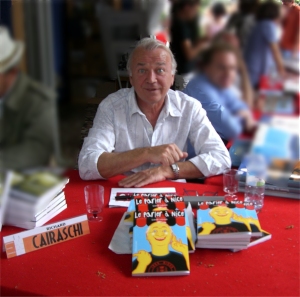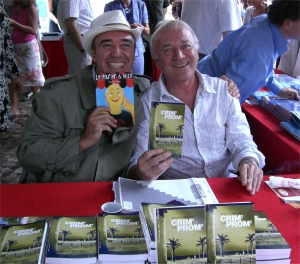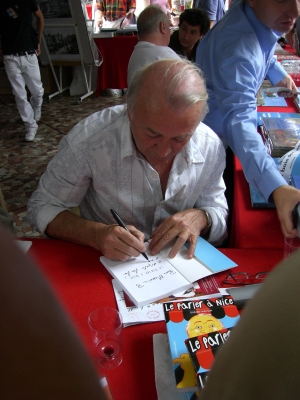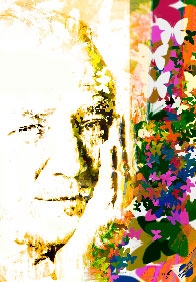
“Come closer, come closer, Ladies and Gentlemen! Today it’s a sale! Come and buy our book; we’ll sign it for you, and as a bonus, you’ll get a photo of us!” say the two Niçois. Friendly and popular moments, during which Nice-Premium did not hesitate to chat with the famous Roger of the azurean stage.
Nice-Premium: Hello Richard, tell us, we’re used to seeing you on stage but not behind a stall selling a book. Well, we admit that “Le parler à Nice et son comté” is a very useful and even necessary book, but how did this book come about?
Richard Cairaschi: After my shows, I always heard someone say, “What did he say? I didn’t understand.” I made a small lexicon at the request of Gilbert Grisoni, my friend, and president of the Gilletta editions. It’s a great pleasure to have written it, and it’s a bit more annoying to come and sell it. But it’s okay!
N-P: Is attending the Book Festival beneficial?
R.C.: Yes, we meet people. The advantage is that it’s a place where people come to see me, talk with me. We discuss the show, the book. What is very surprising is when people tell me that they saw me in a show I performed 10 years ago. For them, it was yesterday. They often ask me, “So, when are you doing something new?” Even though I’m doing new shows. But it’s nice to remain in memory. It’s a pleasure. It’s rewarding. People are kind. It brings life. And then they are ordinary people, they’re not stuck up, they’re not people who say “hello” because they have to. It’s nice and natural.
N-P: In your shows, the audience relates to it.
R.C.: That’s the thing. I tell them their story, and it touches them. It’s not just laughter for laughter’s sake, it’s also about stirring a little memory somewhere that brings an image to their mind. I try to speak with images, to tell a story so that people can see it.
N-P: Your shows, like many artistic performances, are performed at night, but when we attend one of your plays, the day returns, the sun shines again, and the accent sings.
R.C.: I hope so. That’s kind of the goal. Just the fact of getting up, going to the show, getting out even though you have spent the entire day working, I find that effort extraordinary. My thing is to give them a day back but a new and eager day. So that people, when they leave the show, feel happy, a little less disappointed, even happier to live. To give them the desire. Wanting is terrific.
N-P: Tell us about your latest show, which you will perform tonight at the Théâtre de Verdure de Contes.
R.C.: It’s called “C’est déjà demain”. It’s a solo show. The last solo show was “Ma femme est parfaite” in 1996, and I still perform it. It’s a show that ages and matures well. And with “C’est déjà demain”, I tried to do something a little more personal, to talk about myself, and I realize that it did me good to say things as I felt them. I really tried to talk about my stuff. I invented very little; I transformed a bit. There’s a more nostalgic side. People laugh, but for me, laughter is not a quality criterion; it’s important that I manage to give them emotions. The interest is for people to have emotions during a show, that they are not bored, that they don’t have a sore behind, that they don’t look at the watch, and that they don’t escape.
N-P: The program for this summer 2007.
R.C.: This summer, we’re going to perform in the villages. We have about fifteen dates in July and August, with in the middle, a tour of the General Council with the summer events. And that’s when we’re going to do a summary of the trilogy, I’m going to perform five different plays. That way, people will have a choice, but for me, it’s going to be a little more complicated. The technical team I work with is very competent and kind. It’s always a great pleasure to reprise a play despite the anxiety. But I’m happy.

R.C.: It’s a project for cinema or TV to adapt the trilogy. But we meet far more people looking for money than others offering it. Making a theater play requires some money, whereas a film requires a lot of money. There are DVDs. I am also preparing small comedies that last 10/11 minutes about Mediterranean cuisine. I am putting the family together, looking for nice exteriors and beautiful shelters because it is called “La cuisine au cabanon”. We are at the shelter and eat with what is available. We take themes like chard, fish… There will be an old lady who will play the conductor of the story.
N-P: A book to recommend for this summer.
R.C.: For this summer, I highly recommend a very nice book by Bernard Deloupy, “Crime Sur la Prom”. It’s a thriller that reads very easily, which talks about us and with a fantastic story. I recommend it to everyone.
N-P: A final word to conclude?
R.C.: Let’s hope it lasts.
Website: https://www.debi-debo.com/index.html
Note from the Gilletta publisher of “Le parler de Nice et son comté”
Awaited by generations of Niçois readers, the book offers about 300 words from
the most famous to the most tasty…
From origins to pronunciation, from explanation to contextualization, filled with
anecdotes and imbued with Mediterranean culture, this “dictionary” aims to be both
linguistically impeccable and also funny and quirky in the regionalism it evokes.
We will easily recognize the author of these lines or, failing that, we will be eager to
meet him.




